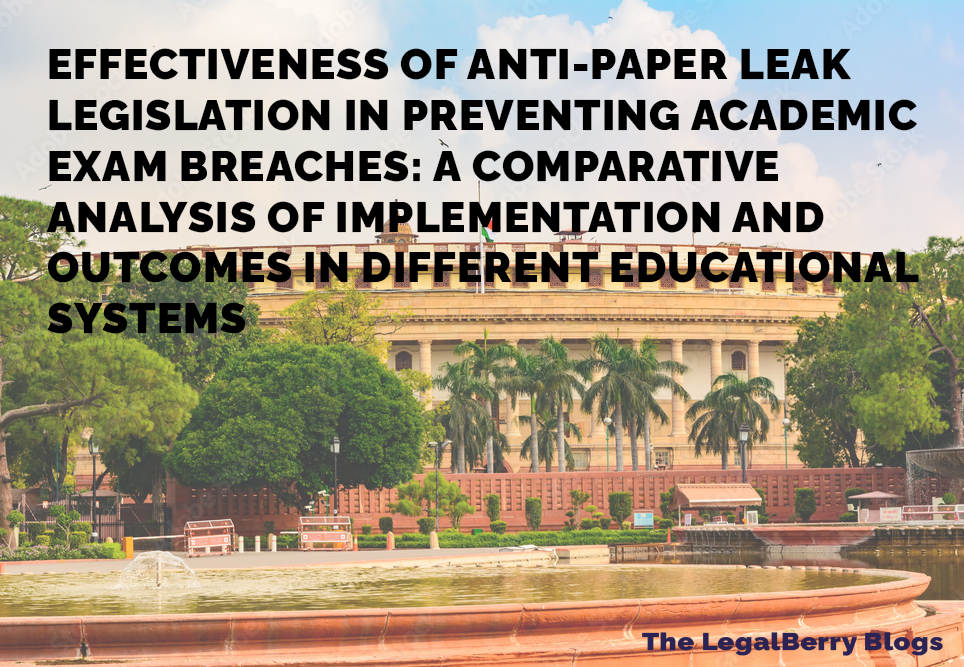EFFECTIVENESS OF ANTI-PAPER LEAK LEGISLATION IN PREVENTING ACADEMIC EXAM BREACHES: A COMPARATIVE ANALYSIS OF IMPLEMENTATION AND OUTCOMES IN DIFFERENT EDUCATIONAL SYSTEMS

| Author:- Pritisha Mahinta |
KEY TAKEAWAYS
- Public Examinations (Prevention of Unfair Means) Bill, 2024 was introduced in the Parliament by Union Minister Jitendra Singh to bargain with unfair means adopted or offenses committed by different substances included in the conduct of public examinations.
- Individuals found guilty of leaking question papers or tampering with exam-related data face imprisonment of 3 to 5 years and fines up to ₹10 lakh. Persons or a group of persons committing a composed wrongdoing will be rebuffed with detainment for a term minimum of five to a maximum of ten years and with a fine of Rs 1 crore.
- Offenses under this law are cognizable, non-bailable, and non-compoundable.
The immediate aftermath of the law’s enactment saw high-profile exams like UGC-NET and NEET being canceled due to reported irregularities, indicating the government’s commitment to enforcing the law rigorously.
INTRODUCTION
In the heart of this vibrant and vast landscape of India, the sanctity of examinations must be upheld as the dreams of the aspirants are sculpted in academic casts. So, to protect the halls where knowledge and integrity are meant to blend, the Public Examinations (Prevention of Unfair Means) Bill, 2024 was passed as a shield against all such deceits. It is a robust legislative shield designed to preserve the righteousness of the nation’s public examinations.
The legislation emerges as a beacon of hope, promising a defense against the shadows of deceit and malpractice that have long plagued the examination system. With stringent penalties and comprehensive measures, it aims to eradicate the corruption and unfair practices that undermine the efforts of honest students. The act instills renewed faith in the educational framework of India.
As this law exists, it is poised to transform the examination landscape, ensuring that every student’s effort is fairly rewarded and every exam remains a true test of knowledge and capability. The journey towards a more transparent and equitable examination system has begun, promising a future where integrity prevails and merit is the sole criterion for success.
The Lok Sabha has cleared a stringent anti-paper leak law known as the Public Examinations (Prevention of Unfair Means) Bill, 2024, which points to addressing misconduct and abnormalities in public enrolment exams by imposing strict punishments, including a maximum imprisonment term of 10 years and a fine of minimum one crore rupees. It marks a noteworthy step in combating scholastic exam breaches in India. This enactment is planned to address systemic issues in the conduct of public examinations. The adequacy of this law can be examined through various viewpoints such as implementation, enforcement, initial outcomes, and challenges.
HISTORY OF THE BILL
The Public Examinations (Prevention of Unfair Means) Bill, 2024, was introduced in response to increasing incidents of malpractice in public examinations across India. High-profile exam leaks, especially those associated with pivotal exams like NEET (National Eligibility cum Entrance Test) and UGC-NET (University Grants Commission National Eligibility Test), have undermined the credibility of India’s examination system. The pervasive problem of paper leaks and cheating has significantly impacted the integrity of public exams, jeopardizing the future of hardworking and sincere students.
The bill was introduced in the Parliament by Union Minister Jitendra Singh. The rationale behind the bill was the absence of a comprehensive central law specifically addressing exam malpractices and unfair means. It aimed to fill this legislative gap by establishing stringent legal provisions against such activities. The bill was subjected to rigorous debates in the Parliament. Several opposition members proposed amendments, focusing on the need for balanced penalties and protecting the rights of students. However, these amendments were ultimately rejected, and the bill was passed in its original form.
KEY PROVISIONS OF THE BILL
Punishments – Chapter III mentions that all the offenses under the act will be cognizable, non-bailable, and non-compoundable. Chapter III consists of sections 9-11 which talk about the punishments for the offences. The bill stipulates severe penalties for those involved in malpractices. Section 10 says that if any individual resorts to unfair means like leaking papers or tampering with exam-related data, then he will be punished with imprisonment of a minimum of three to a maximum of five years and with a fine of up to ten lakh rupees. The provisions of Bharatiya Nyaya Sanhita, 2023 would be applicable to those who makes a default of payment of fine. If any offense under this act is committed with the consent of any Director, Senior Management, or persons in charge of the firm then, they will be punished with imprisonment for a minimum of three years and a maximum of ten years and with a fine of Rs 1 crore or more. But there is also an exception: if the person can prove that he had no prior knowledge of such misconduct and has also exercised due diligence to prevent such mishap, he will be exempted from any punishment. Section 11 talks about organized crimes which is explained under section 2(1)(h), and provides a punishment of a minimum of five to a maximum of ten years of imprisonment with a fine of one crore rupees. If an institution is involved in committing a sorted-out wrongdoing, its property might be subjected to attachment and forfeiture, and the proportionate cost of the examination might too be recovered from it. According to this act, the candidates as described under section 2(1)(a), will not be liable for actions within the purview of the bill and will be secured under the authoritative provisions of the concerned examination authority.
Scope – The bill applies to all major public examinations, as portrayed under Section 2(k), conducted by bodies like the Union Public Service Commission (UPSC), Staff Selection Commission (SSC), Railway Recruitment Boards, and the National Testing Agency (NTA), among others. This wide scope guarantees that all significant exams are ensured under the new law.
Enforcement – The law addresses a range of offenses including leaking question papers, tampering with exam-related computer networks, conducting fake exams, issuing fraudulent admit cards, and allowing unauthorized persons into exam centers. Offenses under this law are cognizable, non-bailable, and non-compoundable. Investigations are to be conducted by officers not below the rank of Deputy Superintendent or Assistant Commissioner of Police. The central government can transfer investigations to any central agency as needed.
INITIAL OUTCOMES
Enhanced Security Measures – There has been an increased use of technology to monitor exams, secure question papers, and verify candidate identities. This includes measures like biometric verification and electronic surveillance which are crucial in preventing unauthorized access and impersonation. The immediate aftermath of the law’s enactment saw high-profile exams like UGC-NET and NEET being cancelled due to reported irregularities, indicating the government’s commitment to enforcing the law rigorously. The increased use of technology in monitoring and securing exams has been a critical factor in improving the effectiveness of the new legislation.
Deterrence Effect – The strict penalties and high-profile cancellations serve as a strong deterrent to potential violators, signaling that malpractices will be met with severe consequences. The stringent penalties imposed by the law, including imprisonment and hefty fines, have created a strong deterrent against exam malpractices.
Initial Enforcement: The proactive approach in canceling compromised exams and initiating investigations reflects a robust enforcement mechanism. The involvement of central agencies like the CBI in these investigations highlights the seriousness with which breaches are being handled.
CHALLENGES AND AREAS FOR IMPROVEMENT
Consistent Enforcement – The effectiveness of the law hinges on consistent enforcement across various regions and examination bodies. There needs to be a uniform application of the law to prevent any regional disparities in handling breaches. While initial actions have been strong, the long-term success of the law will depend on consistent and uniform enforcement across all regions and examination bodies. Ensuring that all stakeholders adhere to the law without regional disparities is essential.
Judicial and Administrative Support – Timely judicial processes and administrative support are crucial for the sustained success of the law. Delays in judicial proceedings or administrative loopholes could undermine the law’s effectiveness.
Addressing Systemic Issues – While the law addresses direct malpractices, deeper systemic issues such as corruption within exam authorities and the pressure on students due to high-stakes exams also need to be addressed comprehensively. While the law tackles direct malpractices, broader reforms in the education and examination systems are necessary to create a more transparent and stress-free environment for students.
Balancing Security and Privacy – The increased use of surveillance and biometric data raises concerns about student privacy. It is essential to balance stringent security measures with the protection of individual rights.
CONCLUSION
In India’s educational sphere, aspirations soar and dreams take flight, Public Examinations (Prevention of Unfair Means) Bill, 2024 stands as a guardian casting its light. This law vows to shield the sanctity of every test, ensuring that every student’s honest efforts are truly blessed and eliminate falsehood. In conclusion, the Public Examinations (Prevention of Unfair Means) Bill, 2024, marks a significant milestone in India’s fight against exam malpractices. It is a robust legislation aimed at curbing exam misconduct. The initial outcomes indicate a positive shift towards more secure and fair public examinations. Its effectiveness in the short term is evident through enhanced security measures and deterrence. However, the law’s long-term effectiveness will hinge on consistent enforcement, judicial efficiency, systemic reforms, and a balanced approach to security and privacy. By addressing these challenges, India can enhance the integrity and reliability of its public examination system, fostering a fairer academic environment. By learning from initial outcomes and continuously improving the implementation framework, India can significantly reduce academic exam breaches and ensure the integrity of its public examination system.
 English
English 



